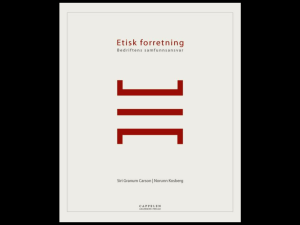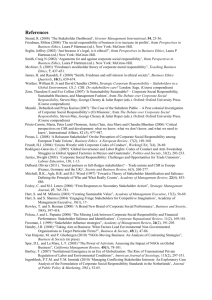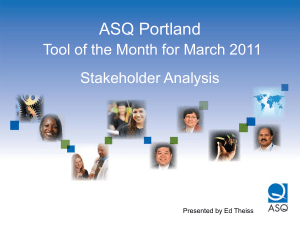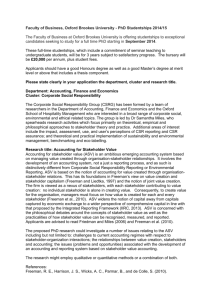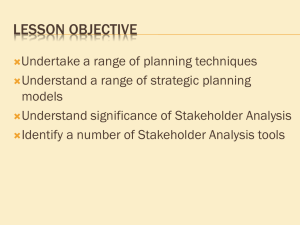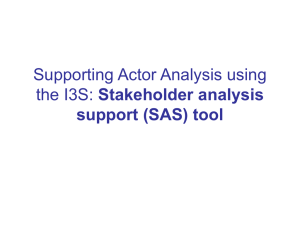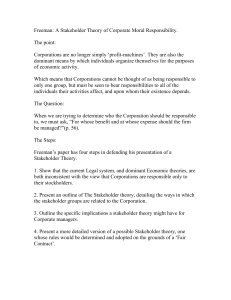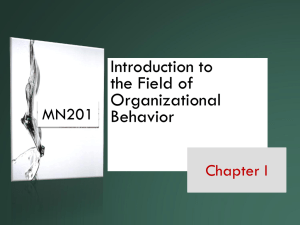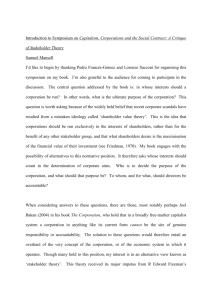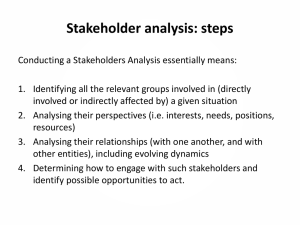Lecture 3 Doing Well.. - Personal web pages for people of Metropolia
advertisement
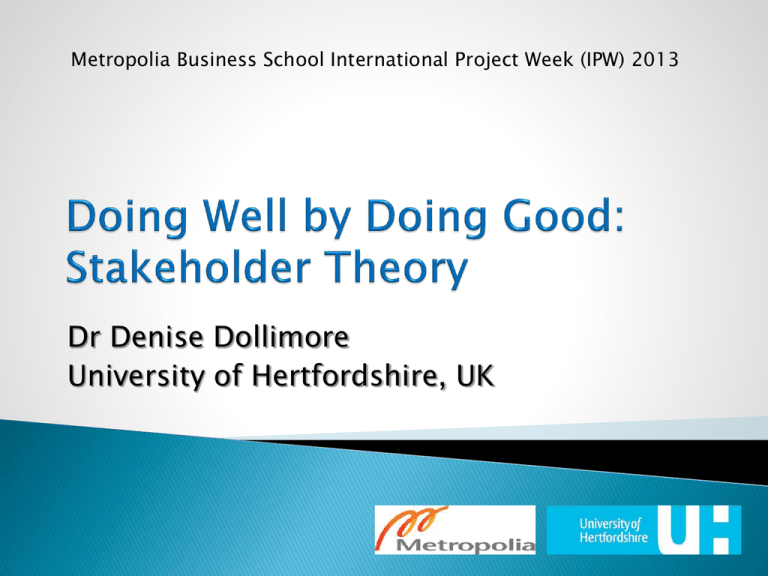
Metropolia Business School International Project Week (IPW) 2013 Dr Denise Dollimore University of Hertfordshire, UK Following this session students should be able to: • Discuss Stakeholder theory and its links to business ethics and CSR • Identify important stakeholders for an organisation and discuss how managers balance the interests of various stakeholders. • Explain the paradox of profitability vs responsibility and evaluate cases using competing theoretical perspectives Stakeholder Theory Edward Freeman 1984 Strategic Management: A Stakeholder Approach Draws on business ethics, from a social justice (deontological) viewpoint, and argues that business actions should be fair. Draws on notion of corporate social responsibility, and argues stakeholder approach is good for business Good corporate citizenship - a way to differentiate (Readings pp 23-28) How can CEOs Change company values? How can organizations become good corporate citizens? A perspective which stresses the responsibilities that corporations have towards society and other stakeholders (King and Lawley, 2013) CSR requires two principles*: 1. 2. The charitable principle, where the more fortunate help the less fortunate The stewardship principle, where the rich hold the wealth ‘in trust’ for the rest of society The belief that these principles, combined with the belief that acting appropriately, result in limited government intervention (rules & regulations) has given CSR considerable credence in business circles (Freeman & Liedtka, 1991) *Traced back to philanthropists of 1930s Now widely agreed that business have obligations beyond their legal and economic obligations towards society Moving beyond compliance with laws to establish new standards Ethical Capitalism* (AKA stakeholder approach) A business approach which seeks to integrate CSR as central to the purpose and activity of an organization Business benefits include Enhanced reputation with consumers Improve human rights, workforce welfare and ecological sustainability Improved relationships with governments positive contribution to national economic and social development *King & Lawley (2013) in Readings Edward Freeman 1984 ‘stakeholder values’ Milton Friedman1970 ‘shareholder values’ Evaluating corporate responsibility using Carroll’s (1991) pyramid [illustrates levels of CSR] Traditionally, CEOs and strategy writers see only forces of competition in operational environment, however… Competitive / operating environment includes numerous stakeholders (Stakeholder Theory, Freeman 1984) Stakeholders can be become allies (affect & affected by firm) They can provide information about changes in the broad environment (social attitudes / trends) They can co-operate in finding new ways forwardand achieve competitive advantage Challenge for firms is to define stakeholders and decide how much to privilege them LEVEL OF INTEREST LOW Least influential Keep informed HIGH Keep satisfied Key players POWER LOW HIGH NIKE? BP? Starbucks? Primart? Key question… Should a business prioritise shareholder value or stakeholder needs? Shareholders own the business Primarily for financial gain Stakeholders are affected by the decisions and operational activities of the business Financial, non-financial and personal benefits n.b., the ‘social contract’ between business and society is constantly evolving (Waddock 2010) Profitability To be an attractive investment, a firm must earn a higher return on the shareholders’ equity than could be realized at a bank. Responsibility Acting in the interest of others, even when there is no legal imperative. Unilever? Johnson and Johnson? Primart? Starbucks? BP? Profitability versus Responsibility The shareholder value perspective Milton Friedman (1970)* ‘The Social Responsibility of Business is to Increase it Profits’ NYT The stakeholder values perspective Edward Freeman (1984) Strategic Management: A Stakeholder Approach p. 36 Readings Origin Business Ethics and corporate social responsibility View of the Firm A network of relationships among the firm and its stakeholders Approach to Strategy Formulation Analysis of the economic power, political influence, rights and demands of various stakeholders (Mendelow Grid) Source of Competitive Advantage Through superior linkages with stakeholders leading to trust, goodwill, reduced uncertainty, improved business dealings, and ultimately higher firm performance (think Porter’s Value Network analysis) Be committed – at top management level Develop a written code of ethics to communicate values to employees Involve middle managers - establish ethics committees to settle disputes Ask line managers to train employees Fire people who violate the code Protect whistle-blowers Withdraw from countries or industries where you cannot act with integrity Social Enterprise: now recognised as the ‘third sector’ (alongside public sector and private business sector) Voluntary, not-for-profit, charitable organisations Forum for the Future (UK, USA): help organisations innovate the products, services and business models needed for a sustainable future (‘philosophy of sustainability’) http://www.forumforthefuture.org/about-us Can find common interests with responsive businesses: ◦ those creating more sustainable business models, e.g. M&S, Unilever ◦ those serving customers in emerging economies Angus describes the way he has successfully embedded Engaged Ethics as a core value of his business and used these ethical initiatives as a powerful differentiator to capture the hearts and minds of all those who touch the brand. Exclusive branded chocolatier, having since become a cocoa grower and built a luxury hotel in St Lucia, CEO, Angus Thirlwell offers insight into how he has achieved growth without compromise of the business’s core values. A ‘socially contributive’ organization Freeman, E. 1984. Strategic Management: A Stakeholder Approach. Boston: Pitman. Freeman and Liedtka. 1991. ‘Stockholders and stakeholders: A New Perspective on Corporate Governance’ Reprinted from California Management Review (1982) King and Lawley. 2013. Organizational Behaviour. Oxford. Waddock, S. (2010) ‘The Social Contract of Business in Society’ in Aras and Crowther eds. A Handbook of Corporate Governance and Social Responsibility 2010 pp. 69-82
